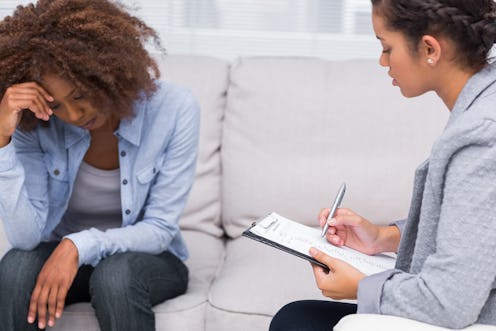Life
This Directory Helps Black Women Find Therapists In Their Area & It’s SO Needed
Finding a therapist can be really difficult, especially if you’re already struggling with anxiety and depression, but finding a trusted, culturally competent therapist as a Black woman is the ultimate struggle. (I know from experience.) In addition to being worried about opening up to a complete stranger, Black women often have to think about if a therapist will understand the racist and sexist microaggressions we face — not commit any themselves. This mental gymnastics can be tiring. That's why Dr. Joy Harden Bradford created The Therapy for Black Girls Therapist Directory.
Dr. Joy, as she is known professionally, created the directory after realizing there was a need for it in the Black community. She tells Bustle, “I created the directory because I continued to see the same conversation around Black women looking for a therapist come up again and again."
“My experience has been that Black women typically prefer to have other Black women as therapists as there tends to be a level of 'feeling seen and known' that exists between Black women,” she continues.
The therapist directory, which can be found on the Therapy For Black Girls website, currently lists over 300 therapists in 34 states and Washington, DC, and Dr. Joy wants to increase that number to 500 and expand to other countries. To navigate the directory, simply click on the picture or name of the state you live in and a picture, website, and phone number of all the therapists in that location will pop up. This one stop shop makes finding a therapist who is a Black woman so much easier.
You can also choose to schedule an appointment with Dr. Joy, who is an Atlanta-based licensed psychologist; she specializes in relationship (romantic, platonic, and familial) management, self-esteem improvement, college to work transition, and depression. Dr. Joy offers group and individual counseling opportunities for Black women, and her goal is simple: “To help you become the best possible version of yourself,” as she says on her website.
If the directory doesn’t list any therapists in your area or you aren’t ready to make the step into a therapy-patient relationship just yet, Dr. Joy hosts a podcast also called “Therapy for Black Girls.” Although the podcast isn’t designed to replace or be a substitute for a relationship with a therapist, it does offer great advice on several topics pertaining to mental health, and it’s not one of those podcasts you have to listen to in order. You can skip around and only listen to the episodes that are relevant to what's going on in your life, or listen to as much as you want.
If you’ve recently lost a family member of friend, “Session 31: Managing Grief” may be a good resource. In it, Dr. Joy chats with Dr. Ajita Robinson, Licensed Clinical Professional Counselor, about “how therapy can be helpful in working through grief” and “why the stages of grief you may have learned about may not be the best way to help you conceptualize grief.” The podcast also has episodes that focus on friendships, racism, terrorism’s effect on mental health, suicide, and more.
Dr. Joy tells Bustle, “The podcasts have allowed me to share more about what the therapeutic process looks like for people who may be curious and has allowed me, along with my guest therapists, to talk about issues that are important for Black women to know about and helpful in improving their mental health.”
While having a therapist who is the same race and gender as you is not a requirement, a 2011 review of studies found that African-Americans had a strong preference for a therapist who was also Black, and when they had one, their perception of the relationship was better, and they had better therapeutic outcomes.
For too long, there has been a stigma in the Black community about seeking help for mental health issues, but Dr. Joy believes Black women can benefit tremendously from talking to a therapist. “When we look at the world we live in and the significant ways Black women are often mistreated and abused, there is a lot of healing that needs to take place for us to really have full and joyful lives,” she says.
In a society where Black women are often marginalized, therapy is a way for us to center ourselves. Dr. Joy’s directory and podcast are tools to help Black women heal and make ourselves a priority. If that’s not a good goal for the upcoming new year, I don’t know what is.
